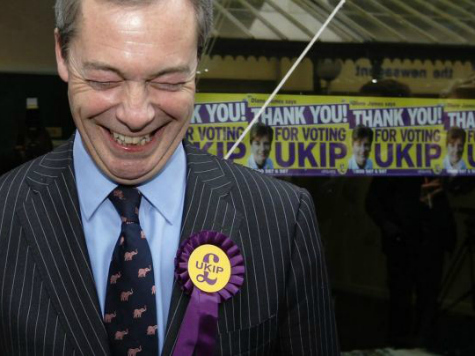
In just a few days, voters in Wythenshawe and Sale East, in the North West of England, will go to the polls in a by-election to decide who they want as their Member of Parliament following the death of Labour representative Paul Goggins.
A poll published this week shows that the Labour Party is pretty much a shoo-in for the seat, but the attention after the by-election will likely rest with the Conservative Party (Tories), and the UK Independence Party (UKIP), both of which are battling it out for second place.
There are no rewards for second place, of course, but the bragging rights for the right-wing UKIP — which has only in recent years managed to play a significant role in what was otherwise a relatively closed, three-party system — are tantalising.
If UKIP can once again gazump the Conservative Party into second place, as it has done in previous by-elections, it will be able to claim a mandate the likes of which the Tories haven’t been able to exercise in years, and which the Left-wing Liberal Democrat party will look upon enviously.
Currently, in Wythenshawe and Sale East, the Labour Party is polling at 61 points, with UKIP on 15, the Conservatives on 14, and the Liberal Democrats on just five. If UKIP remains in second place, and manages to put some daylight between themselves and the Tories, it will embolden the party’s claims to being the second choice political party in the North of England, which for the most part, traditionally votes Labour.
As we’ve already noted, a significant number of Labour voters are also switching to UKIP, in what some describe to me as a “post political spectrum” move. UKIP is not Right, nor is it Left, they argue. Instead the party focuses on its version of realism — what is good for the nation — a philosophy backed by its call this week to redirect UK foreign aid to flood victims in Britain.
But the reality is not just that UKIP is gaining ground, but that the Conservative Party is in perennial decline — some would argue, rightly so. BBC’s Newsnight programme interviewed a number of people about the sheer drop in the number of members of the Conservative Party.
In 1953, the Tories under Winston Churchill had 2.8m members, the programme noted. In 2005, it was down to 250,000. By 2013, it stood at just 134,000 members, which goes a long way to explaining why the Conservatives find it so difficult to maintain an army of activists in constituencies across the country.
Tim Aker, head of policy for UKIP said, “The Conservative Party has been in decline for many years… They can’t fight elections without calling in help from other branches, other regions. We [UKIP] now have teams out regularly every weekend. We can out-man them.”
And Aker’s claims seem to be reflected in a new poll that shows the Conservative Party is behind in connecting with voters for the by-election. Locals have reported that they have scarcely seen a Conservative activist around, while bumping into UKIP or Labour is common occurrence.
When asked what the local parties had done in the area on the run up to the by-election, 63 percent of potential voters said they had received Labour leaflets. Fourteen percent said they had seen posters or billboards from Labour. Nineteen percent said they had their doors knocked on by Labour activists, and 22 percent of people said they had received “personal letters,” and seen stalls or leafletting nearby. Seven percent said they had received a phone call from a Labour activist.
Compare this with UKIP, whom 47 percent claimed they had received leaflets from; 12 percent said they had seen posters, six percent had received a visit, 16 percent had received a “personal” letter, and 24 percent had seen stalls or leafletting nearby. Only one percent received a phone call.
Then there is the Conservative Party, whose figures belie the real problems within its grassroots operation. Only 35 percent of potential voters have received leaflets. Just four percent had seen posters, only 13 percent had received a letter, and a pathetic eight percent had seen stalls or leafletting nearby. Again, just one percent had received a phone call.
It might be argued that in an election that it knows it cannot win, the Conservative Party is simply exercising frugality. But if that is indeed the calculation, it is a poor one. Coming in third would be far more costly for the party than spending a couple of thousand pounds more.
There are numerous theories behind the decline of the Conservative Party, from the centralisation of party control, to a tepid leadership. Some even claim the Tories are not Left-wing enough! The truth is that there is a toxic concatenation of factors beleaguering David Cameron’s Conservatives.
Conservative MP Jackie Doyle Price admitted on Newsnight that, “The issue of same-sex marriage,” which the Conservative Party championed in a bid to ‘detoxify’ its brand, “…upset a lot of traditional conservative voters.”
And while same-sex marriage has surely played a key role in the Tory party’s dwindling membership, there are other factors which remain to be confirmed: a nonsensical, fiscally burdensome commitment to tackling ‘climate change’, a failure to cut taxes hard and fast enough, a failure to offer a vision and reconnect with working class voters. The list goes on.
In the mean time, I’m predicting a UKIP second place at the by-election next Thursday — a devastating result for the Conservative Party heading into May’s European Elections, and next year’s General Election.

COMMENTS
Please let us know if you're having issues with commenting.